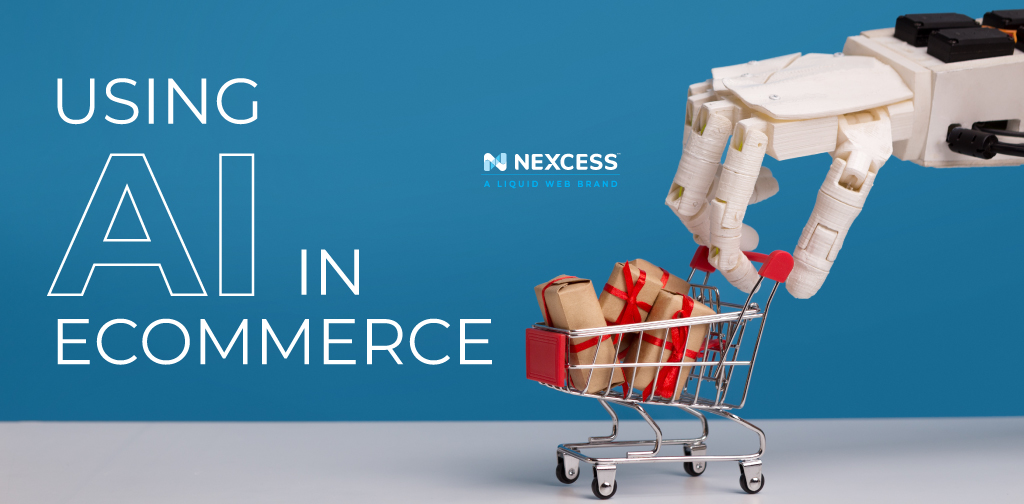Whether you loved The Jetsons or feared The Terminator, we bet you were expecting that robots would be doing everything for us by now. In some ways, they are. If you’re running an ecommerce business, you’re used to having a lot of irons in the fire. Using artificial intelligence for ecommerce can help you streamline your online business operations, saving you both time and money.
What is Artificial Intelligence in Ecommerce?
When you hear artificial intelligence, you might be thinking about robots that have gained thoughts and feelings. It’s a little less science fiction than that. Artificial intelligence, or AI, refers to systems or machines that complete tasks normally completed by humans.
A cash register adds up several totals, adds tax, and adjusts for any coupons. Store employees don’t have to do that math — that’s AI. Imagine how much longer lines would be if everything was calculated manually.
AI is “programmed” by the data it is fed. The more information an AI system has, the more knowledge it gains. AI can be applied to every part of the customer journey — and utilizing it impacts data analysis, lead generation, customer satisfaction, and more.
That being said, you’re not “using AI” so much as you’re using a solution developed with it. There are a couple of terms that are sometimes used interchangeably with AI — but there are subtle differences within them. Let’s talk about machine learning and marketing automation.
Machine Learning for Ecommerce
Many of the solutions you’re using likely utilize machine learning to determine results. Machine learning is the process wherein the AI is trained by the actions taken or within data collected. That training helps to inform results that relate to your business.
Your email account uses machine learning. Every time you mark something as spam, your email provider recognizes the domain the spam was sent to and what content it contains. As you continue to mark items as spam, the provider can more easily identify potential spam and route it to your junk folder instead of your inbox — it’s why order and password emails often end up in spam, because they use common phrases found in phishing attempts.
Machine learning for ecommerce is incredibly helpful because it can predict customer behavior. This can be incredibly useful — what business wouldn’t love to know what you want even before you do? It can also border on being creepy, so it’s important to toe the line between personalization and intrusion.
Another application of machine learning is within direct customer interactions. If you’ve ever used automated assistants — or had Google ask you “Did you mean…?” — then you’re familiar with being asked to confirm information and say a few words about what you need. The system you’re communicating with “learns” from your input and continues to interact and make decisions based on that input.

There are two main types of machine learning: supervised and unsupervised. The main difference between the two is that supervised uses already labeled data, while unsupervised uses algorithms to categorize the data it analyzes. If you’re really interested in machine learning, IBM is a great resource.
Machine learning, therefore, is how AI becomes AI. You can’t automate tasks without a system having “learned” what it needs to do.
Marketing Automation
If machine learning is driver’s education, and AI is getting your license, then marketing automation is the car you take to work.
There are countless software solutions that automate your ecommerce tasks. Some are free, some are expensive, and some you may not even realize count as automation. So, what is marketing automation?
Marketing automation is a tool or software that produces a result that’s beneficial to your online business. Think of marketing automation tools as the Alexa for your ecommerce store. You give it a task, and it does it for you. Marketing automation utilizes AI to automate different tasks that span each part of the customer journey. It may rely on data analyzed by machine learning.
Running an online business means doing a lot of different work simultaneously. You need a website, social media presence, and customer support — just to name a few. Marketing automation helps you do the smaller tasks so you have more time for the work that can’t be automated.
Any actions you can automate that will streamline your workload will not only save you time, but money, too. Let’s talk about why and where you should be using artificial intelligence in ecommerce.
Should You Be Using AI?
We know running a business can be difficult and confusing, especially if you’re brand new to running an online store. Wondering if AI is right for your ecommerce business?

You’re probably already using it! Whether you’ve sent a bulk email, used a SaaS tool to analyze customer satisfaction, or checked what product sells the most this month — you’re using AI in your stores already. Let’s talk about how and where you should be (or already are) implementing AI in your ecommerce strategies.
Why Should I Use Artificial Intelligence for Ecommerce?
Many business owners map out their strategy, see what needs to be done, and think “Oh! I can do that myself.” Sometimes you can — but utilizing AI-based technologies for your ecommerce store will supercharge your efforts. With artificial intelligence for ecommerce, you can:
1. Make better marketing decisions faster.
2. Enhance customer experience with faster, more focused support.
3. Segment data more easily for better targeting and positioning.
4. Experience higher-quality lead generation and management.
5. Enable your team to focus on the more important work that can’t be automated.
… and a lot more! Technology is always advancing so the possibilities are endless. Right now there are still a lot of ways AI can benefit your ecommerce business.
Where Do You Use AI for Ecommerce?
AI and marketing automation fits into every area of your business. A lot of the following ways to use AI work for one particular part of your company — but affect your team as a whole. Check out where you are (and should be) using AI and pay attention to how each part of your business works with the other.

Lead Generation
Marketing automation tools can help your team get better leads, leading to more conversions for less effort (and ad spend). Tools like Marketo, Constant Contact, and HubSpot help marketing teams track campaigns, manage leads, gain insights, and create better campaigns in general.
AI assisted solutions don’t just capture data — they analyze it. They can track patterns in purchasing, similarities between customers, and even qualify leads. AI can determine who, if, and how often leads open or click through emails. This can aid in increased accuracy in segmenting and improved targeting — and better targets make for informed positioning.
You can also automate email campaigns, minimize repetition, and improve your speed in converting leads to customers.
Content Marketing & SEO
Content creation can be automated, though you can judge for yourself whether or not the quality is what you’re expecting. Options like Copy.ai and Anyword are tools that generate copy. Some of them even let you create personas to generate copy for. If you have a few different types of customers you market to, you’re able to auto generate the best copy for them.
While this can reduce the workload for your content team, if it’s drawing on the most popular phrases to get results, it can sometimes come off as noticeably not-human. However, depending on your needs, it may be the right solution for you (and much more affordable).
Services like Grammarly can help your copy (or even just emails to your team) sound more professional. Nobody likes being called on a typo! When you run your copy through a service like this, it not only catches spelling errors, but it also makes suggestions for grammar and sentence structure, ensuring you always sound your best.
Tools like BrightEdge and SEMrush help you conduct keyword research, audit your site’s SEO, and help you improve your page ranks with the data it produces. SEO is one of the most important parts of your marketing strategy. Without showing up in the search engine results pages, you’ll be hard pressed to turn a profit.
Social Media
Every brand has a social media presence. The more channels there are to advertise on, the more of a strain it is on your team. You need to schedule and publish posts, track interactions, reply to questions, and even mitigate reputation management issues. Automated solutions, such as Sprout Social or HootSuite, let you drive all the cars at once.
Social listening is an important part of marketing tasks — and it’s time consuming to do manually. Automating social listening means you can set up software to alert you for brand mentions, keep an eye on competitors, and track relevant keywords so you can focus your content on what’s trending for your industry. Sprout Social does a great job of integrating all your social channels and monitoring.
You can utilize chatbots to assist with getting sufficient information before connecting them to a sales rep. This can eliminate wasting time if there’s a solution the chatbot can provide (like business hours) allowing your staff to focus on more important work. There are great options like ChatBot.com and HubSpot that offer low cost or free, easy-to-integrate options.
Sales
Let’s face it. You’re in ecommerce because you want to sell something. The hardest part of any transaction is getting the “yes.” Luckily for us, there are plenty of ways AI can assist your business with sales.
If you’ve been in ecommerce a while, you’re familiar with Customer Relationship Management software, or CRMs. Solutions like Salesforce analyze leads for you and prioritize them — meaning your reps will talk to the people most likely to result in a sale first.
Sales forecasting can be seriously improved when you’re usings software that takes a look at your sales history, trends, and customer activity. If you know exactly when products are selling their best, you know when to order inventory. It can help you navigate when you need to advertise, when you should plan sales, and ultimately save you money by not wasting time or budget. Salesforce has Sales Cloud Einstein that does exactly that.
Much like social media’s use of chatbots, using them can also be of great benefit for your sales team. Getting information ahead of time lets you route them to the right people. Maybe they need support — but maybe they actually need sales. Having an AI-enabled chatbot means customers aren’t being sent to several different people, and therefore they’re less frustrated with the process.
Your Business In General
Whether your business has 10 employees or 1000, you want everything to run smoothly. With so many different processes going on, it can feel overwhelming. Let’s talk about where AI can help your ecommerce business in a more general sense.
Not every business can afford an entire HR department. Zenefits and ADP are HR management solutions that automate tasks for your business. Zenefits is more geared towards smaller businesses, while ADP is a better fit for larger organizations. Whether it’s benefits, payroll, or taxes — automated solutions mean your business can focus on selling instead of paperwork.
You’ve probably heard of task management software like Asana. While it enables your team to organize their tasks and communicate through each step of the process, it also has features that measure how long tasks take to complete, which enable you to plan better for future tasks.
If you’re working remotely, you’re probably using communication software like Slack. While it is primarily a chat service — there are apps (just like a WordPress site!) that enhance functionality. You can install Clockwise to connect your Google Calendar to Slack, set work hours, and optimize focused time. Reminders of when you are about to start a meeting are super helpful when you’re heads down on a big project. Slack also integrates with Asana, Trello, Jira, and other task management software.
Hosting Your Business In The Age of Science Fiction
We’re doing things today that our grandparents likely never thought possible. Everything is instant, virtual, and improving all the time. Now that you know lots of ways to bring your ecommerce business into the future with AI — you’re going to want a host that matches your energy!
Nexcess doesn’t just have lightning fast speeds and top notch security — we’re here to support your business in smart ways.
Our Managed WooCommerce and StoreBuilder hosting plans are built on WordPress, which has a giant library of extensions that help automate processes in your store.
We’re a proud partner with HubSpot — an industry leader in marketing software and marketing automation options.
Nexcess also exclusively offers Sales Performance Monitor with every WooCommerce and StoreBuilder plan — which tracks trends and alerts you to when something changes. We also offer WooCommerce Automated Testing, which runs important tests daily to ensure your store is always working and problems are caught before your customers encounter them.
Want to stay on the cutting edge? Try Nexcess StoreBuilder today.

